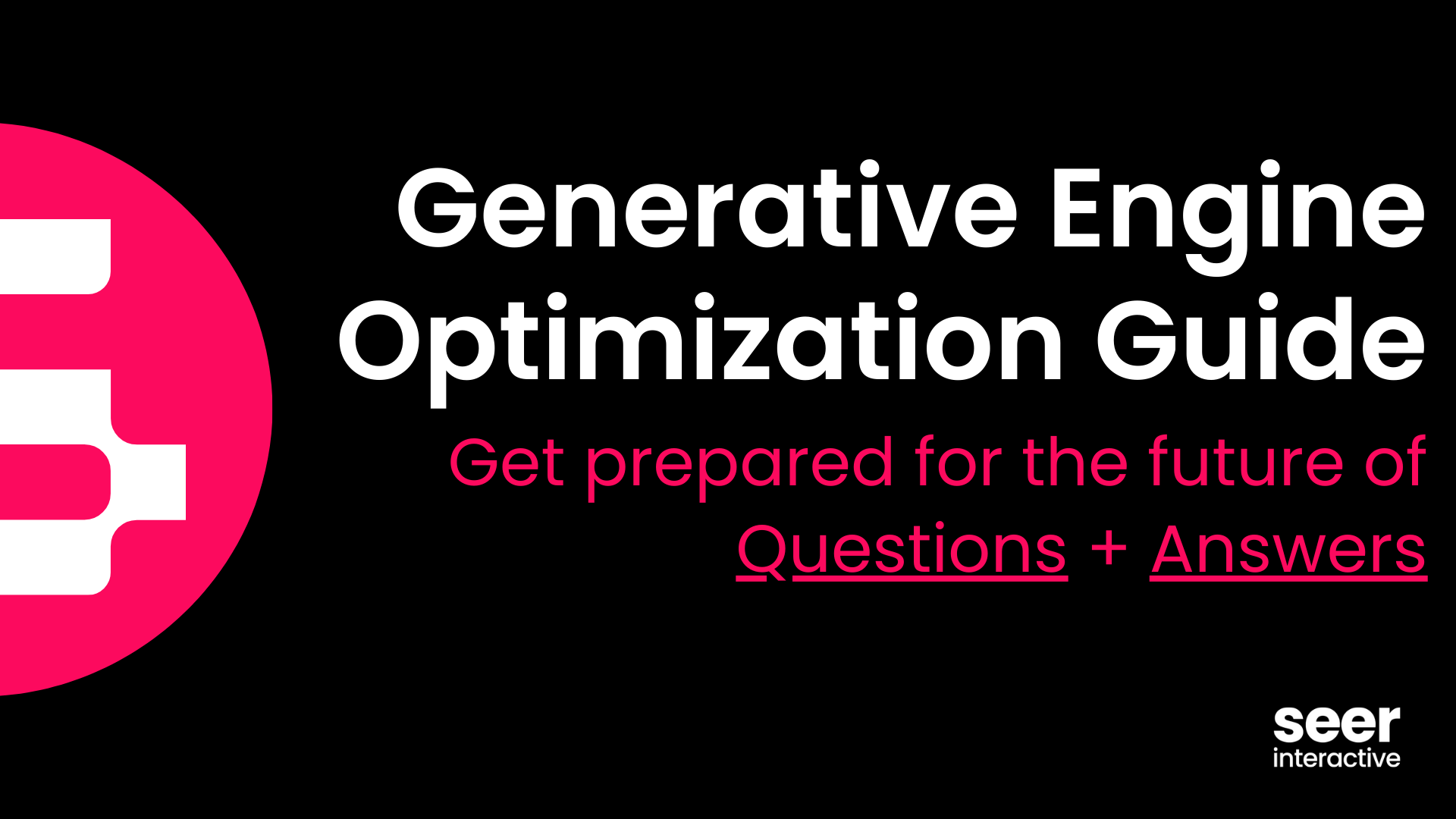This post isn't only for companies looking for RFP guidance for their upcoming SEO project.
-
In-house teams: understand what to expect and how to align agencies with your roadmap
-
Agencies: prepare for smarter client questions and refine your approach to pitching
-
Companies with existing SEO partners: evaluate your teams’ future readiness
>>> Take me right to the questions! <<<
As the digital marketing world is becoming more and more fractured, companies have to manage all that complexity and find a partner who can lean into that complexity. TikTok, YouTube, Pinterest, and other sites with search boxes are showing up more and more. Artificial intelligence & Generative AI is reshaping the how SEO work gets done and how our customers get answers. Google is adjusting algorithms at an unprecedented pace, removing automated spam that is growing exponentially due to the AI content boom.
We manually reviewed 6 blog posts on this topic and most could be written by ChatGPT today, we checked, so we decided to blow ours up and write something completely unique.
If you are a company with questions around the future of search, and how AI plays into that, and more importantly – how to assess if a partner is keeping up, then I think you’ll like these questions you should ask an SEO Agency during the RFP process.
A little background on typical RFPs and why I believe they fall short.
A well crafted SEO Request for Proposal (RFP) is more than just a template (here's our old one), it needs to take into account this changing world, it deserves thoughtfulness. Most SEO projects are take some amount of time to show results, so you have to be super intentional about your process and whom you pick and how prepared they are to navigate the changing times ahead.
Traditional RFPs, often fall short in addressing the nuanced demands of the modern SEO realities / landscape in 2024. The importance of SEO RFPs extends beyond the basics:
- Budget
- Scope
- Goals
- Evaluation criteria
- Submission guidelines
When the world is changing this much, the RFP needs to go a level deeper and can be a critical tool in deciphering which SEO agencies offerings are “keeping up with the times” & how “future-ready” is my current SEO team or agency given the changes on the horizon?
By reframing the conversation around SEO RFPs to focus on these advanced topics, we set the stage for a more meaningful evaluation of an agency's ability to not just react to changes, but to predict them & proactively lead the charge in the SEO space.
There is no doubt that Artificial Intelligence is changing the SEO game, we have new AI powered browsers like ARC and Google’s doing that in Chrome too, and new places like ChatGPT, Perplexity, to find answers, we have AI tools to help us build content blazingly fast, and we’ve got Google issuing new penalties, like this one in March, for those who do.
Here are the 41 new questions you should be asking your SEO agency during the RFP process in 2025.
AI questions to consider for your SEO RFP:
- Walk me through 1 example of an SEO process at your agency through a “pre-AI” and “post AI” lens. Why did you pick that process to change and what is next?
- Gartner has predicted that searches will drop over the next 3 years, how does your agency view that assumption? & How do you validate / invalidate assumptions about changing search behavior.
- How might your agency approach determining if my customers are starting to move over to sites like Gemini / ChatGPT / Perplexity for answers?
- In an LLM world, how is the work you are doing for me today (Link Building, Technical SEO, Content, Internal Linking, EEAT signals, etc) also likely to pay dividends in an “AI search” world. Which ones will have the biggest crossover impact?
- Walk me through a proposal from 2022 or 2023 and compare how you executed on the same tactics then, now, in an AI world...which areas are AI optimized and which are on your roadmap, and can we see it?
- With the increasing role of AI in content creation, how do you ensure that our content strategy retains authenticity and genuinely engages our target audience?
- We’ve considered blocking AI bots from crawling our site, as a way to protect our data from being used in answers, what are your thoughts on that?
- What strategies do you recommend for optimizing content for language models, and how do these strategies differ from traditional SEO best practices?
- What is your AI usage policy? What tools can your team use and not use?
- Assuming your team is using AI to help with the project, how do you disclose what you are using AI for?
- How do you track our visibility in Generative AI, and how do you evaluate our market share?
- How have AIO overviews impacted click through rates, but also business impact?
- Walk me through your methodology on discovering which types of content I have are most likely to be disrupted?
SEO agency ability to pivot / adapt questions
- Given these 5 changes in the last few months take 1 of these changes and articulate how your process as an agency has changed to keep up with that recent change for your clients.
- Here is a new SERP layout in Google, how would you determine how widespread this issue is and how that layout impacts our business – bonus for any ideas on how we optimize for these.
- Google makes changes to their layouts all the time. Those layouts can significantly impact where customers click, which may impact the value of a top ranking, how do you find those shifts and what do you do about those?
- How does your agency catch new Google layouts, evaluate impact, and pivot strategy?
- Take this query, notice how it is all (OTAs/Big E-commerce, Aggregators, Review sites etc ), how would you help us rank against those folks (detail is key).
- There are penalties now for automating content with AI, how do you use AI in a way that doesn’t expose your clients to risk?
Integrated search across divisions questions
- What unique data can we provide to you that allows you to take a unique approach to our SEO strategy? (CRM, Calls, Partner Domains, Programmatic, etc)
- We have data available in paid search, social, youtube, etc how would you use it to make our SEO better?
- We see more YouTube & Reddit results showing up, given that how they have spiked, how do you believe that will help/hurt our SEO campaign?
- How do you use SEO data to help us better understand our customer in ways that can help the SEO team, but also the entire enterprise?
- When I get a top ranking, should I shut off my SEM bids for that keyword?
- Where are other places other than Google where people go to get answers that your team is researching?
- Our customers are starting to go to TikTok/G2/Private Groups more and more, what role, if any, do you play on their platform?
Hands on SEO research questions
- Here is a tactic that our existing SEO efforts has uncovered on a competitor site, what do you think, would you replicate it, stay away from it or take a different approach?
- To the best you can, reverse engineer our last year of SEO efforts, what did we do more of or less of and how did that impact our current state?
- Find something on our site that you believe is out of date, walk us through what you would do to revive it, outline how you picked the thing you did and how you think that would impact our goals?
Budgeting, Project Scope, Results, and ROI questions
- When predicting the impact of ranking better on search engines, how do you project results over 12 months? Do you revisit CTRs and projections in a project lifecycle?
- CTR’s are declining, how do you help me to explain changing landscapes to our executives so they understand why rankings might be going up, but traffic is down, and why SEO should maintain its current level of investment.
- What is a common thing SEO agencies typically do, that you question the value of and why?
- If I told you that the leads coming from our SEO effort are low-quality, how would you tackle that response?
- How do you reconcile the need for quick wins to demonstrate value with the necessity of implementing a long-term SEO strategy that may require patience before seeing significant results? How do you communicate this balance to stakeholders to ensure continued support and investment?
- How do you tie your work to business impact beyond rankings?
- Let’s say we have to cut half our budget 5 months into the project, walk us through how you would determine where to make those cuts?
- How do you manage team member transitions, and can I speak to a client who has had a recent team member transition off their project to understand how you respond and react?
- How do you help clients who have chosen to transition their work to another agency, in house, etc? May we talk to a client who has done this?
- Lets imagine Google makes a massive change, and that change requires new work to hit our goals, you as an agency had no idea this change was coming, so how do you manage the scoped project against what our new needs are, what does that process look like?
Aligning stakeholders questions
- How do you navigate the complexities of multi-division collaboration (IT, Brand, PR, Technical) in SEO projects? How does your agency work to ensure that all stakeholders not only understand but also value SEO's impact on the broader business goals?
- SEO success is frequently gauged by rankings, traffic, and (maybe) conversions. How would you involve stakeholders in defining and agreeing upon holistic success metrics that capture the full value of SEO to the organization, including brand visibility?
Here are some of our thoughts on the basics of an SEO RFP
What is the value of an SEO RFP?
You can learn more about the different types of SEO and some of the commonly used acronyms of the channel on our SEO Acronyms and Terms page.
Once you are more familiar with SEO, or if you already are, let’s explore how you can find the right partner.
An SEO Request for Proposal (RFP) is a document that invites formal bids from potential SEO providers to provide their services.
This step isn’t always necessary, but may be a procurement requirement at your organization. If it is, it is best to send the RFP to a number of providers, as this gives you a full range of SEO approaches to objectively evaluate the agency you will be working with.
Including 5 to 10 agencies should give you a diverse set of approaches to find the right fit for you. RFPs also create structure to open-ended challenges. Making the RFP clear is critical to the success of your SEO program going forward.
What Should be Included in an SEO RFP?
Project scope and objectives: Outline specific tasks, deliverables, and goals to ensure alignment between the SEO strategy and business objectives. Include historical SEO efforts to prevent overlap.
Technical requirements: Highlight technical aspects needing attention, such as website architecture, page speed, mobile-friendliness, and structured data. This helps determine if the agency has experience with your tech stack.
Reporting: Define frequency, format, KPIs, and level of detail required in reporting. This ensures transparency, accountability, and facilitates communication.
Timelines: Provide a schedule with key milestones and deadlines, allowing for flexibility and regular performance evaluations. This helps agencies evaluate their capacity to meet deadlines.
Budget: Include a budget range or limitations to guide realistic recommendations. Focus on expected value in terms of revenue, profitability, or growth to determine the desired rate of return.
Selection criteria: Clearly define criteria such as experience, expertise, references, pricing, and methodology to streamline the evaluation process and ensure alignment with expectations.
Common SEO RFP Mistakes:
- Being too specific limits creativity and potential strategies
- Asking too many questions = a lot of work for the agency, limiting responses. You can always ask for links to existing resources so they can focus their time on the questions that are more nuanced
- Blind RFPs, most agencies will believe they have no shot and might not participate, so some amount of outreach / past relationship matters
- Leaving too much to procurement may miss some of the nuance which highlights opportunities for agencies to show working styles, and allows you to get a feel for fit
Once responses are received, objectively evaluate them using a consistent scoring method. Share feedback with all respondents to maintain transparency and set the selected partner up for success.
[TIP] Need a scorecard to help with your evaluations? Click here.
What should you do once you have responses from potential providers?
You’ve done all of the prep work, sent out the requests, and received responses to your RFP from a few potential providers. Now what?
Objectively evaluate all responses to make sure they are meeting your needs and expectations based on the criteria above. Using a consistent scoring method across all evaluations will keep the evaluations objective. Use this agency evaluation template if you don’t already have one.
Once the evaluation is complete, make sure you share feedback with all respondents, even the agencies that you do not select. This transparency is not only appreciated, but keeps the door open down the road if you decide to conduct another RFP in the future. Feedback also helps your selected partner make improvements from the start. This will set everyone up for success.
Interested in partnering with Seer as your digital marketing agency? Let's talk!


.png?width=1075&height=336&name=updated-41-unique-seo-questions-for-2025%20(1).png)

.png)